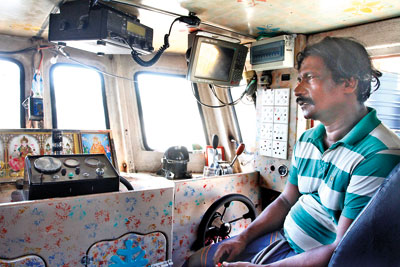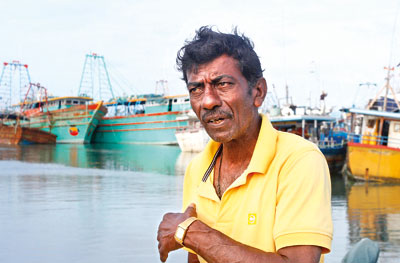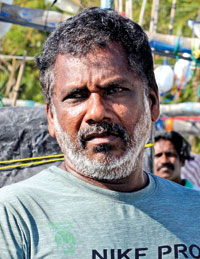News
Indian aid no justification for plunder, fishers decry theft and attacks
View(s):By Tharushi Weerasinghe Reporting from Myliddy, Jaffna
At the northern tip of the Jaffna Peninsula, just west of Point Pedro, lies Myliddy, a once-thriving fishing village long cut off by war. Since its release from a high-security zone in 2017, locals have been working to rebuild their lives. The reopening of the harbour a year later was meant to mark a new beginning.
But today, Myliddy’s fishermen say their livelihoods are under threat from two fronts: on land, they are being choked out of the harbour by seized Indian trawlers occupying critical space; at sea, they face constant pressure from Indian trawlers poaching and attacking the less equipped locals.

The Myliddy harbour. Pix by Indika Handuwala
“We have to squeeze our boats into about 160 feet, which means about four multi-day boats can fit into the actual pier, and others have to anchor into the sea because the trawlers take up so much space,” said fisherman Prabu, 44, who docks at Myliddy.
The harbour consists of a 3.5-hectare basin and an 80-meter quay wall. Now, it is the only harbour available in the Northern Province to cater to multi-day fishing and is built to allow both small fishing boats and multi-day boats.
“These bottom trawlers take up 75% of the space in the harbour,” admitted Myliddy Harbour Manager Murugamoorthi Thirukumaran. At present 121 seized Indian bottom trawlers are docked at the harbour, tied up in legal proceedings.

A. Newton
The harbour was opened for fishing after the war in 2019, but courts have only been ordering trawlers to be held there since 2021, following the discontinuation of the practice in Karainagar. “One or two of the boats were released, but no one came to claim them and the longer a boat is kept here without servicing, the more unfit for use it becomes because of monsoon damage and the sea water,” Mr Thirukumaran said. The navy intercepts and then hands over to the Coast Guard, who hand the poachers over to the Ministry of Fisheries for legal procedures.
According to the Sri Lanka Navy, 23 trawlers have been taken into custody so far in 2025, and 174 fishermen have been arrested. “Our fleet is deployed 24/7 because this is a matter of national security on top of the socio-economic and environmental concerns,” said Commander Buddhika Sampath, spokesman of the navy.
The challenge lay in the volumes of trawlers coming in.

Edward Sylsvester
“They come in groups of about 40 or 50 at a time, and while we do curb to a large extent, some are extremely large and have steel hulls,” he added, noting that assets are deployed based on availability and the threats. While the navy receives regular operational directives from the Ministry of Defence, many fishermen felt that security along Sri Lanka’s international maritime boundary line (IMBL) with India should be tightened.
“We report Indian trawlers, but the navy says they haven’t been ordered to act,” said A. Newton, 48, a multi-day boat skipper. “There’s a huge difference in how our navy and theirs respond to poaching. Ours needs to be tougher.” Years ago, Mr Newton was arrested by Indian authorities for crossing into their waters—something he says Indian poachers do routinely, often violently. “They ram our wooden boats with their steel hulls if we confront them. Maybe our government is just too powerless to defend us.’’
Another fisherman, Mr Nadesan, said: “I once fell asleep and woke up to an Indian trawler dragging my boat, and I had to cut the ropes to save it. They steal our fish, then attack us without fear. Their boats are massive; we’re nothing in comparison.”
Sri Lanka’s northern waters remain far richer in marine resources than those off the southern coast of India, largely because decades of conflict kept them relatively untouched. In contrast, years of relentless bottom trawling on the Indian side, a destructive and unsustainable practice, have severely depleted fish stocks.

T. Nadesan
“The boundaries are clear, but the big brother nation keeps playing politics,” said former fisheries minister Douglas Devananda, alleging that arrests of Indian poachers are often used for electioneering in Tamil Nadu, where most offenders come from. “It’s not just Delhi—Tamil Nadu’s government must lead these talks and be part of the solution.”
He proposed that seized trawlers be dumped mid-sea, where they become fish breeding grounds over time. “It helps replenish resources and sends a clear message to poachers.”
Mr Devananda noted that the issue only came into full view after the war ended and needed a response rooted in research and adaptation. At its core, he said, it’s a livelihood crisis. “We need to address it diplomatically and legally, while also equipping our own fishermen better.”
In January, fishing community leaders from across the Jaffna Peninsula and nearby islands met with the Indian High Commission in Jaffna to hand in a petition. They proposed joint naval patrols by India and Sri Lanka to curb illegal fishing, called for direct dialogue between fishermen from both countries, and suggested placing buoys along the IMBL to aid nighttime navigation.
The two countries have an existing agreement for annual meetings between their navies and Coast Guard at the IMBL, with the most recent held in November 2024. Hotlines between maritime forces remain active. India has also introduced measures to shift fishermen from bottom trawling to deep-sea fishing, including incentives and vessel conversions.
The Indian government has supported aid initiatives for northern fishermen, including a US$65 million grant to renovate Kankesanthurai Port and plans to establish a centre of excellence in mariculture in Jaffna. It has also provided fishing equipment and gear to locals.
But community leaders claim this distracts from the real issue.
“Aid doesn’t justify the ongoing plunder of our resources — we’d need less of it if our fishermen were simply allowed to earn their livelihoods,” said Yardson Figurado, Director of the Mannar Social and Economic Development Organisation. According to him, the North and East are rich in marine resources like prawns and crabs, and could thrive if left undisturbed. “If Indian fishermen stayed out for just 10 years, these provinces could develop immensely.”
He noted that a temporary pause in poaching was between April 15 and June 15. “They stopped just for the recharging period. The moment it ended, they returned in full force. Compounding the issue, he said, is the use of powerful trawlers fitted with Leyland bus engines. “They scrape the seabed clean, sometimes dragging two boats with one engine. There’s no way we can compete with that.”
“It costs so much to mend the nets. A net costs about Rs. 100,000 and each boat needs about 10, so apart from the loss of fish, we lose our equipment and boats,” said Chairperson of a local fishing association Edward Sylsvester, who operates a smaller boat from Myliddy. “I feel so helpless because most of the time they turn their lights off and we can’t hear anything over our motors, so we don’t know they’re there until it’s too late.
He added that while four fishermen in his association had been promised nets from the Indian government six months ago, none had received them yet. “But it is irrelevant to the issue — some of us received nets from the Chinese government, does that mean we should let them come and poach too?”
Speaking at a press conference this week, Fisheries Minister Ramalingam Chandrasekar said that arrests and boat confiscations will continue if Indian fishermen enter Sri Lankan waters illegally. “There is no room for compromise,” he said, adding that diplomatic steps have been taken and naval resources increased to curb the incursions. “Their trawler boats have already damaged our marine resources—if this continues, our seas risk turning into a marine desert.”
India has consistently held that the only way to address this issue is through dialogue and constructive engagements to achieve a long-term and sustainable solution.
Efforts are also underway to get fishermen associations from both countries to come together for discussions.
| NARA says lives of small-scale fishers wrecked Indian trawling has severely disrupted the livelihoods of Sri Lankan small-scale fishers, particularly those using NTRB, MTRB, and OFRP boats, with catch losses reaching 60–80% near key fishing zones like Delft Island due to damaged breeding grounds. “Indian fishers are reported to enter Sri Lankan waters three nights a week—Monday, Wednesday, and Saturday—[but] Point Pedro fishers claim the activity happens every night,” said Aruna Maheepala, senior scientist at NARA. The incursion affects both equipment and operations, with Sri Lankan fishers frequently losing or damaging nets, limiting their ability to fish at night and forcing them to bear higher fuel and gear costs. “Because they can’t fish at night, they have to go out more often during the daytime, which increases the fuel costs.” The use of bottom trawlers and smaller Indian boats deploying bottom lines and gill nets made of nylon adds to the disruption, intensifying competition and reducing available fishing grounds. The economic toll is significant. Reduced catches have slashed incomes, pushing families to cut household expenses and depend on intermittent church support for essentials like school fees. NARA has also found that many fishers have debts taken on to purchase gear or for daily needs. “We have had many local fishers warn that without intervention, the viability of traditional fishing practices and their communities could collapse.”
| |
| “Respecting Sri Lanka means respecting the rights of our fishermen,” says Deputy Minister of Foreign Affairs “Poaching is one of the most pertinent issues on the table in our conversations with the Indian government,” said Arun Hemachandra, Deputy Minister of Foreign Affairs, addressing concerns over ongoing illegal fishing by Indian trawlers in Sri Lankan waters. He noted that this was far from a new concern, as fishermen in northern communities have been “raising it for years.” Assuring continued diplomatic engagement, the minister confirmed that the joint working group on fisheries, a formal bilateral mechanism, is still actively working toward a long-term solution. “We will continue to enforce the law,” he said, affirming the government’s commitment to upholding territorial integrity and protecting its fishermen. While acknowledging the complexity of the issue, Mr. Hemachandra emphasised that “there is no standard timeline or fixed solution,” noting that multiple approaches must be considered. “The most sustainable approach is diplomacy, and that is what we use. But where boats still breach our boundaries despite that, our security forces have to intervene,” he said. The minister held that neither government was deliberately allowing these incursions to happen. “Our friendship with India and the assistance we receive does not mean we turn a blind eye when citizens are harmed,” he said. “Protecting our fishermen is not negotiable, and we’ve made that very clear.” He was careful to distinguish between the socio-economic conditions of the fishermen and those who profit from illegal poaching. “The fishermen who do poach are also from low-income backgrounds, but they are not the issue – the owners of the trawlers who exploit their connections with politicians are,” Minister Hemachandra said, adding that it was vital for these stakeholders to understand the importance of territorial sovereignty.” He added that while clear communication with the Indian central government was important, there was growing consensus that the Tamil Nadu state government must also be brought into the conversation. Responding to a query raised by the Sunday Times on whether India’s provision of aid to Sri Lanka affected its negotiating power on the matter, the Minister said that Sri Lanka’s gratitude for Indian aid and cooperation does not equate to compromise on sovereignty or justice. “India has been a strong supporter, and we’re grateful. But aid will never dictate our justice or sovereignty, and India respects that,” he said, noting that India’s support of Sri Lanka has not had ulterior motives that required unfair compromise. Ultimately, he reiterated, “Respecting Sri Lanka means respecting the rights of our fishermen.” The Sunday Times reached out to the Indian High Commission in Colombo, which did not comment. |
The best way to say that you found the home of your dreams is by finding it on Hitad.lk. We have listings for apartments for sale or rent in Sri Lanka, no matter what locale you're looking for! Whether you live in Colombo, Galle, Kandy, Matara, Jaffna and more - we've got them all!

